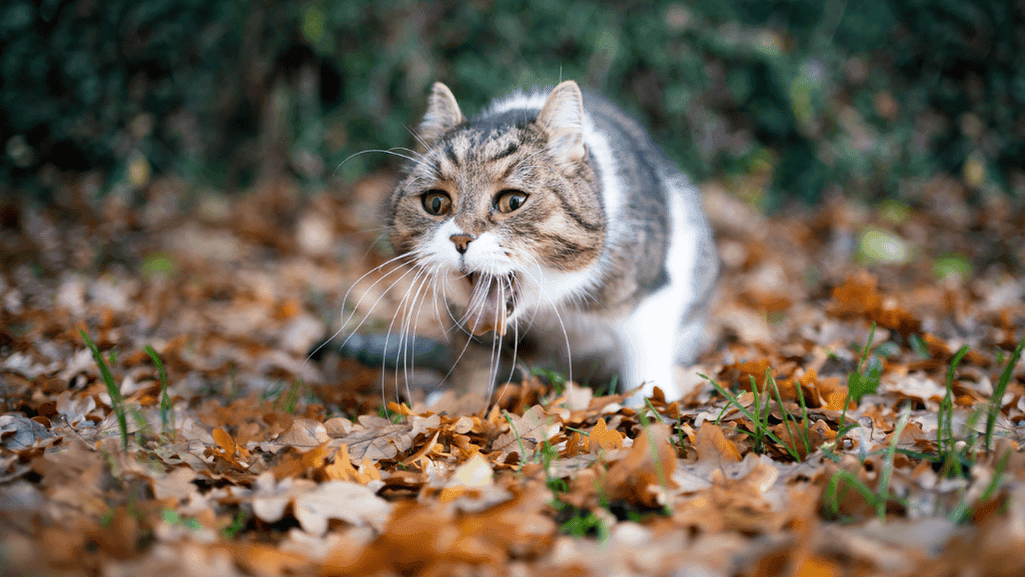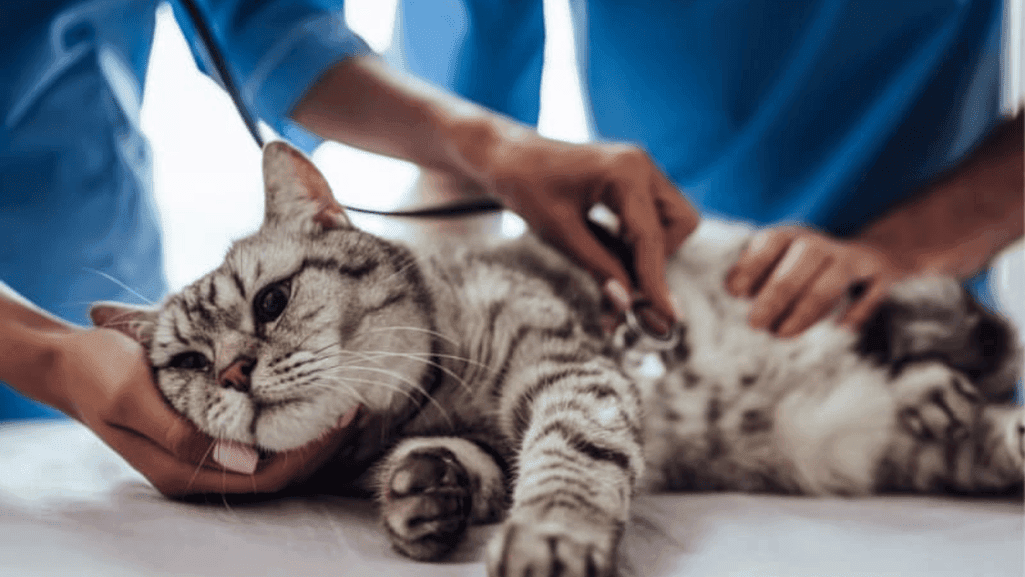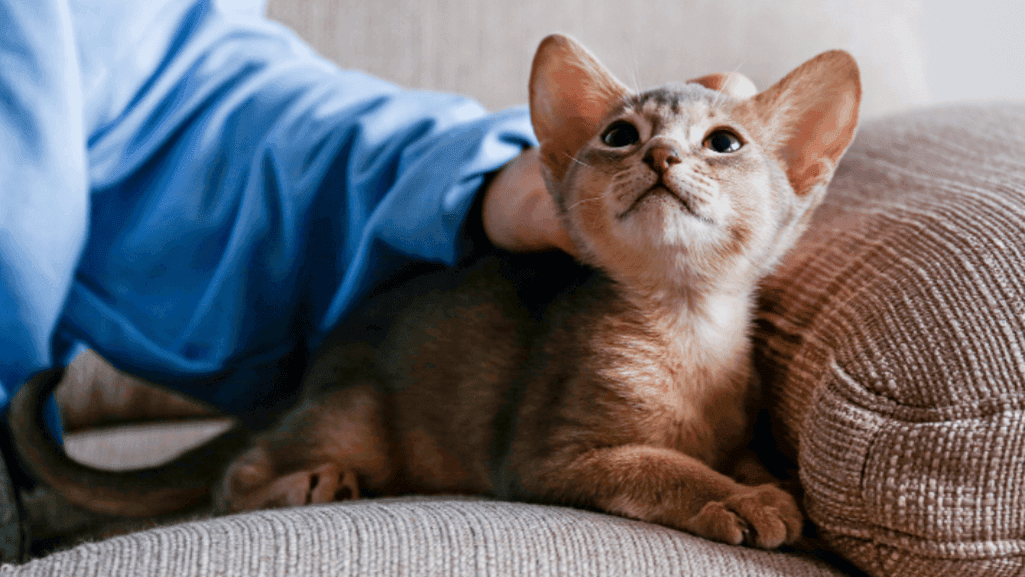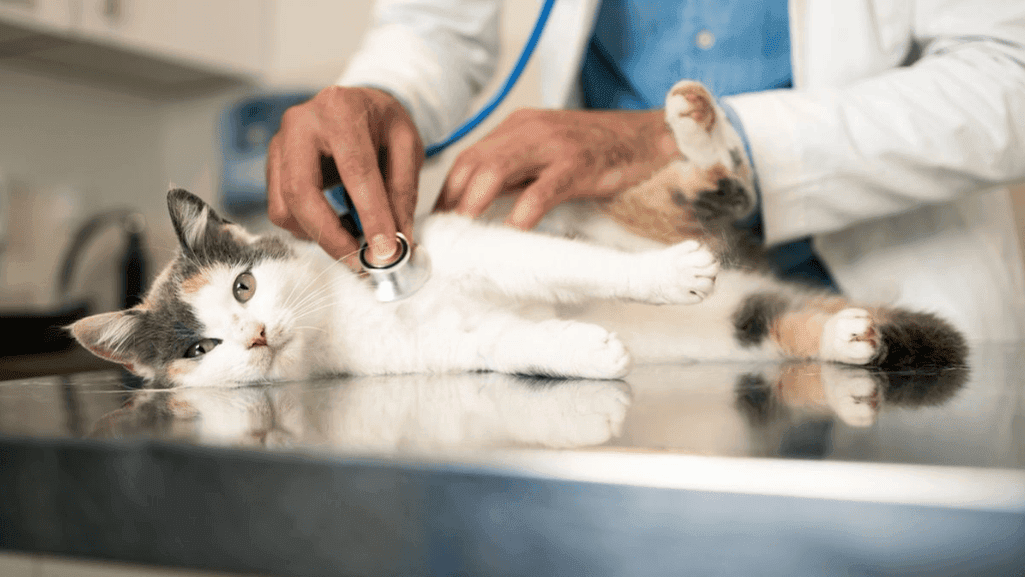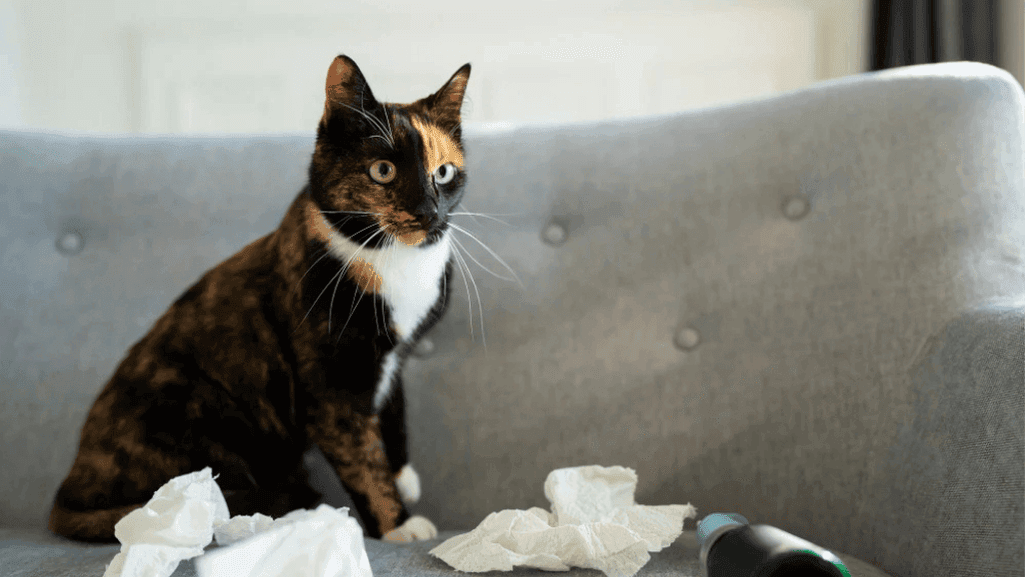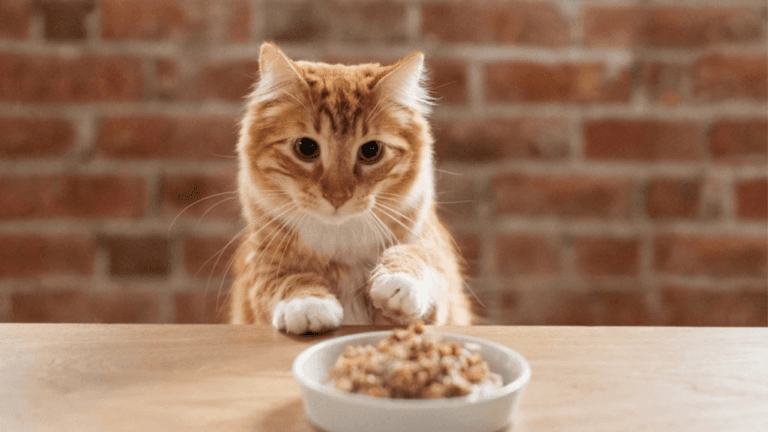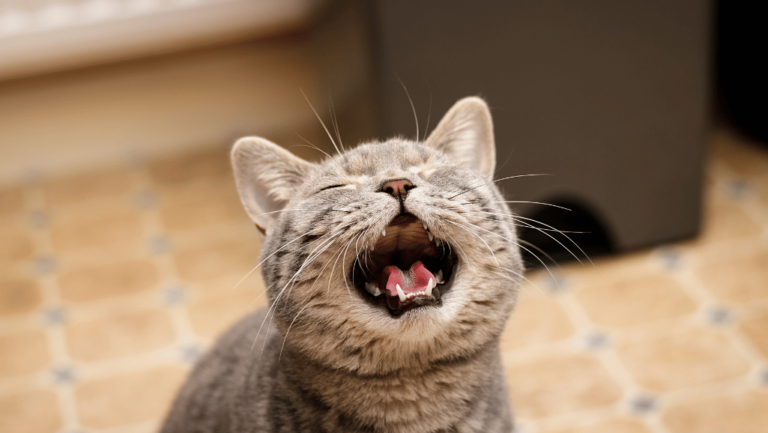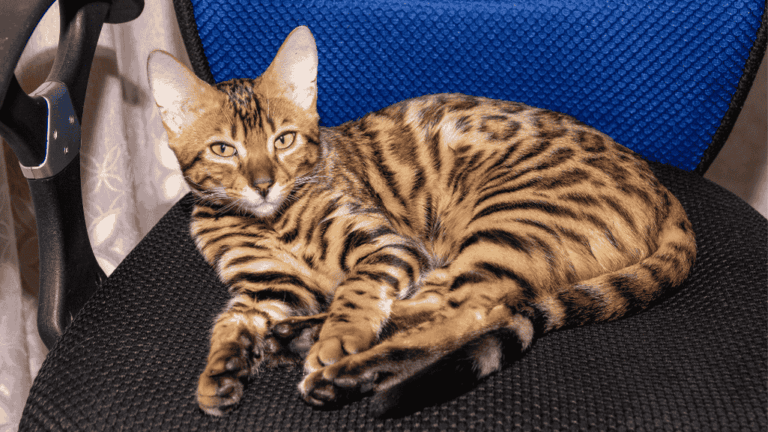As a cat owner, seeing your cat vomit can be upsetting. While it’s normal for cats to vomit sometimes, frequent vomiting is a worry. If your cat keeps throwing up, it’s important to know why and when to see a vet.
Chronic vomiting in cats means they vomit at least once a month. If your cat vomits more than three times, can’t keep food down, and seems tired, see a vet fast. Many things can make cats vomit, like toxins, drugs, food issues, and health problems.
Finding out why your cat vomits can be hard. A vet will usually do some tests to check for serious problems. The color of the vomit can give clues. Tests like X-rays and blood work might be needed.
Many things can make cats vomit, like hairballs, toxic foods, and health issues. Finding and treating the cause early can help your cat feel better and avoid serious problems.
Key Takeaways
- Frequent vomiting (more than once a week) or vomiting with other symptoms like tiredness or blood in the vomit needs vet attention.
- Many things can cause vomiting in cats, including toxins, drugs, and health problems.
- Tests like X-rays and blood work can help find the cause of vomiting in cats.
- Early treatment can greatly improve your cat’s life and prevent serious issues.
- Keeping harmful things like plants and small objects away from cats can prevent vomiting.
Understanding Feline Vomiting
As a cat owner, knowing the difference between vomiting and regurgitation is key. It’s also important to understand the difference between acute and chronic vomiting. This knowledge helps you know when to get cat vomiting treatment.
Difference Between Vomiting and Regurgitation
Vomiting is when your cat forces out stomach contents. It often comes with nausea and stomach contractions. Regurgitation, on the other hand, is when food comes up without going through the stomach. While some cats may regurgitate normally, frequent regurgitation can be a sign of cat digestive issues or cat stomach problems.
Acute vs. Chronic Vomiting in Cats
Acute vomiting lasts less than 2-3 days and usually gets better with treatment. Chronic vomiting, which happens often over time, might mean a serious health issue. Chronic cat vomiting can point to problems like food allergies, inflammatory bowel disease, or even cancer.
“Cats expel hairballs one or two times a week on average, but if your cat is vomiting more frequently or showing other symptoms, it’s vital to consult your veterinarian.”
If your cat keeps vomiting and shows signs like tiredness, diarrhea, or weight loss, see a vet fast. Your vet can run tests to find out why and create a treatment plan for your cat.
Understanding the differences in vomiting, regurgitation, and acute vs. chronic vomiting helps you watch your cat’s health closely. Early action is important to keep your cat healthy and prevent small issues from becoming big problems.
Common Causes of Cat Vomiting
As a cat owner, knowing why your cat might vomit is key. It could be hairballs or serious health issues. Understanding these causes helps you care for your cat better.
Hairballs
Hairballs are a big reason for cat vomiting, affecting about 25% of cats. Cats groom by eating their fur, which can build up into hairballs. While some hairballs are normal, too many might mean your cat has cat digestive problems or gastrointestinal issues.
Dietary Issues and Food Intolerance
More than 50% of cat vomiting is due to diet changes or eating habits. Food allergies in cats can lead to cat stomach issues and vomiting. Cats might also get sick from certain foods, causing cat illness signs like vomiting. Eating too much or too fast can also make them throw up.
“Cats with food allergies or sensitivities may experience chronic vomiting, diarrhea, and other digestive issues. Working with your veterinarian to identify and eliminate problematic ingredients can help alleviate these symptoms.” – Dr. Sarah Johnson, DVM
Gastrointestinal Disorders
Many gastrointestinal disorders can make cats vomit. Conditions like inflammatory bowel disease, constipation, and tumors are common. These issues can cause long-term cat digestive problems and need vet care to manage symptoms and find the cause.
Infections and Parasites
Infections and parasites can also make cats vomit. Bacterial infections, viral illnesses like feline panleukopenia, and parasites like roundworms can cause cat gastrointestinal issues. Regular vet visits and preventive care can catch and treat these feline diseases early.
Other reasons for cat vomiting include:
- Ingestion of foreign objects or toxic substances
- Metabolic diseases (e.g., kidney disease, hyperthyroidism)
- Stress or anxiety
- Motion sickness
If your cat vomits a lot or severely, see your vet. They can find the cause and help your cat feel better. Knowing why cats vomit and keeping up with their health can make them happy and healthy.
When to Be Concerned About Your Cat’s Vomiting
While cats sometimes vomit, it’s not always a big deal. But if your cat vomits a lot or shows other signs of illness, it’s time to see the vet. Dr. Teller says to watch out if your cat vomits more than a few times a month or seems tired or doesn’t want to eat.
Acting fast is important to help your cat feel better. Serious reasons for vomiting include eating bad things, allergies, parasites, and even cancer. Quick action can stop things from getting worse and keep your cat healthy.
Keep an eye on how often and what your cat vomits. If they keep throwing up food, they might not get enough nutrients. The color of the vomit can tell you a lot:
- Green vomit may mean they ate plants or their stomach is empty.
- Yellow vomit often means bile and an empty stomach.
- Red vomit could mean bleeding in their digestive tract and needs vet help right away.
- Black, tarry vomit means there’s blood and you need to get to the vet fast.
- White vomit usually means there’s foam.
Get vet help if your cat vomits a lot, doesn’t eat, or has diarrhea too. Vomiting a lot can make them dehydrated and lead to liver disease. If your cat looks really sick or gets worse fast, go to the emergency vet. Cats with health problems that start vomiting need vet care right away to avoid getting worse.
Diagnosing the Cause of Feline Vomiting
When it comes to chronic vomiting in cats, finding the cause is key. Veterinarians use many tools to figure out why your cat keeps vomiting.
Physical Examination and Medical History
The first step is a detailed physical check-up and a look at your cat’s medical history. Your vet will ask about your cat’s diet and any recent changes. They’ll also want to know about the vomiting episodes. This helps find the possible causes of cat vomiting.
Blood Work and Urinalysis
Blood tests and urinalysis help find health problems that might cause vomiting. These tests check for toxins, parasites, and diseases. For older cats, they also check for kidney disease, as it’s common in frequent vomiting.
Imaging Tests (X-rays, Ultrasound)
X-rays and ultrasound scans show what’s inside your cat’s body. They help find masses, foreign objects, or problems in the digestive tract. These tests are great for finding hairballs, a common cause in long-haired cats like Ragdolls.
Endoscopy and Biopsy
Sometimes, more detailed tests are needed. Endoscopy uses a camera to look inside the digestive tract and take tissue samples. This helps diagnose diseases like inflammatory bowel disease or tumors, which can cause chronic vomiting in cats.
“Understanding why cats vomit, the types of vomit, and appropriate treatment is essential for maintaining feline health.” – Veterinary Expert
Vets use these tools and your cat’s history to find the cause of vomiting. They then create a treatment plan. If your cat keeps vomiting, it’s important to get vet advice for cat vomiting quickly. This ensures your cat gets the best care.
Treatment Options for Cat Vomiting
Dealing with cat vomiting depends on the cause. Often, cat vomiting remedies can be used at home. But, if your cat vomits a lot, shows signs of dehydration, or has blood in their vomit, see a vet fast.
Dietary Changes
Changing to a bland diet can help an upset stomach. Special cat foods, like Hill’s Prescription Diet i/d Digestive Cat, support digestive health. If your cat has food allergies, removing the allergen is key.
Medication
Your vet might give different meds for vomiting. Anti-emetic drugs stop vomiting, and antacids like famotidine treat cat acid reflux. Antibiotics fight bacterial infections, and anthelmintics like Joii Wormer for Cats tackle parasites. For inflammatory bowel disease in cats, steroids or immunosuppressants may be used.
Surgery
In serious cases, like blockages or tumors, surgery is needed. Endoscopic procedures can remove foreign objects or get biopsy samples for diagnosis.
“Prompt treatment is essential for cats experiencing severe or persistent vomiting to prevent dehydration and other complications.”
Supportive Care
Supportive care is key for managing cat vomiting. This includes fluids for dehydration, cat nausea remedies like Cerenia, and products for gut health, like Oralade GI Support Fluid for Dogs and Cats. For cat motility disorders, prokinetic agents help digestion.
While some vomiting is normal, frequent or severe vomiting needs vet care. This helps find and fix the cause.
Preventing Cat Vomiting
To keep your feline friend healthy and minimize instances of vomiting, it’s essential to focus on cat hairball management, maintain a balanced feline diet, and stay vigilant about cat illnesses. By following these guidelines and seeking veterinary advice for cats when necessary, you can effectively address cat diet problems and alleviate cat health concerns.
One of the most important aspects of preventing cat vomiting is providing a well-balanced, age-appropriate diet. Avoid sudden changes in food, as this can upset your cat’s sensitive digestive system. If your cat has a history of dietary issues, consider working with your veterinarian to develop a specialized meal plan that caters to their specific needs.
Regular grooming is another key part of minimizing hairballs, which are common in long-haired cats. Brush your cat’s coat often to remove loose fur before it can be ingested during self-grooming. In some cases, over-the-counter hairball remedies may be recommended to help prevent these uncomfortable and potentially dangerous blockages.
To further reduce the risk of vomiting, keep toxic substances and small objects out of your cat’s reach. Curiosity can lead cats to ingest harmful materials, such as string, rubber bands, or even houseplants, which can cause intestinal blockages or poisoning. By maintaining a safe environment and providing appropriate toys, you can help prevent these types of incidents.
Scheduling regular check-ups with your veterinarian is essential for monitoring your cat’s overall health and identifying any underlying issues that may contribute to vomiting.
During these visits, your vet can perform physical examinations, run necessary tests, and provide personalized recommendations based on your cat’s unique needs. By staying proactive and addressing any concerns promptly, you can help ensure your feline companion remains healthy and happy for years to come.
why does my cat keep throwing up
If your cat keeps vomiting, it’s normal to worry. Sometimes, vomiting isn’t a big deal. But if it keeps happening, it might mean there’s a health problem that needs help fast. Knowing what to look for and when to see a vet is key to keeping your cat healthy and happy.
Frequency of Vomiting Episodes
How often and how bad your cat’s vomiting is can tell you a lot. Dr. Fout says some cats vomit more than others. But if your cat is vomiting a lot or seems really upset, you should notice other signs and talk to a vet. Vomiting a lot can cause dehydration and other serious problems that need quick treatment.
Potential Health Concerns
There are many reasons why cats might vomit. Some are simple, while others are serious. Common reasons include:
- Hairballs, mainly in long-haired cats
- Dietary indiscretion or sudden diet changes
- Food allergies or gastrointestinal issues in cats
- Eating things they shouldn’t or toxic substances
- Infections, parasites, or inflammatory bowel disease
- Chronic illnesses like kidney disease, pancreatitis, or hyperthyroidism
- Stress and anxiety causing digestive problems
- Cancers in the digestive tract
Watching what your cat’s vomit looks like can help figure out what’s wrong. Yellow vomit might mean bile, while coffee ground-like or black vomit could mean bleeding. If you see undigested food, it might mean they’re eating too fast or have a blockage.
Seeking Veterinary Advice
If your cat keeps vomiting or shows other scary signs like being really tired, not wanting to eat, or in pain, get vet help fast. Dr. Adams says to watch one episode, but more or other signs mean it’s time to see a vet. Early help can stop bigger problems and make sure your cat gets the right care.
Vomiting in kittens is a medical emergency due to their higher risk of dehydration and possible blockages. – Dr. Little
Your vet will check your cat, look at their health history, and might do tests like blood work or imaging. They’ll figure out why your cat is vomiting. Treatment could be changing their diet, medicine, surgery, or just helping them feel better, depending on what they find.
By watching your cat closely, noticing when they vomit, and getting vet help when needed, you can help keep your cat healthy and happy.
Conclusion
Cat vomiting can be upsetting for both the cat and its owner. Sometimes, vomiting is normal, like when they cough up hairballs. But, if it happens a lot, it might mean there’s a bigger health issue. This could be feline pancreatitis, cat inflammatory bowel disease, or even cancer.
Watching how often and what your cat vomits can tell you if they need a vet. Tests like blood work, X-rays, and ultrasound can find out why your cat is vomiting. This way, you can start the right treatment.
Remedies for cat vomiting might include changing their diet, giving them medicine, or reducing stress. It’s important to work with your vet to find what works best for your cat. This way, you can quickly fix their vomiting problem.
Preventing vomiting is also important for your cat’s health. Regular vet visits, a good diet, and reducing stress can help a lot. By being careful and proactive, you can keep your cat happy and healthy for a long time.

